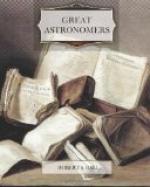I remember visiting the observatory of one of our greatest modern astronomers, and in a large desk he showed me a multitude of photographs which he had attempted but which had not been successful, and then he showed me the few and rare pictures which had succeeded, and by which important truths had been revealed. With a felicity of expression which I have often since thought of, he alluded to the contents of the desk as the “chips.” They were useless, but they were necessary incidents in the truly successful work. So it is in all great and good work. Even the most skilful man of science pursues many a wrong scent. Time after time he goes off on some track that plays him false. The greater the man’s genius and intellectual resource, the more numerous will be the ventures which he makes, and the great majority of those ventures are certain to be fruitless. They are in fact, the “chips.” In Kepler’s case the chips were numerous enough. They were of the most extraordinary variety and structure. But every now and then a sublime discovery was made of such a character as to make us regard even the most fantastic of Kepler’s chips with the greatest veneration and respect.
ISAAC NEWTON.
It was just a year after the death of Galileo, that an infant came into the world who was christened Isaac Newton. Even the great fame of Galileo himself must be relegated to a second place in comparison with that of the philosopher who first expounded the true theory of the universe.
Isaac Newton was born on the 25th of December (old style), 1642, at Woolsthorpe, in Lincolnshire, about a half-mile from Colsterworth, and eight miles south of Grantham. His father, Mr. Isaac Newton, had died a few months after his marriage to Harriet Ayscough, the daughter of Mr. James Ayscough, of Market Overton, in Rutlandshire. The little Isaac was at first so excessively frail and weakly that his life was despaired of. The watchful mother, however, tended her delicate child with such success that he seems to have thriven better than might have been expected from the circumstances of his infancy, and he ultimately acquired a frame strong enough to outlast the ordinary span of human life.
For three years they continued to live at Woolsthorpe, the widow’s means of livelihood being supplemented by the income from another small estate at Sewstern, in a neighbouring part of Leicestershire.
[Plate: Woolsthorpe Manor. Showing solar dial made by Newton when a boy.]
In 1645, Mrs. Newton took as a second husband the Rev. Barnabas Smith, and on moving to her new home, about a mile from Woolsthorpe, she entrusted little Isaac to her mother, Mrs. Ayscough. In due time we find that the boy was sent to the public school at Grantham, the name of the master being Stokes. For the purpose of being near his work, the embryo philosopher was boarded at the house of Mr. Clark,




